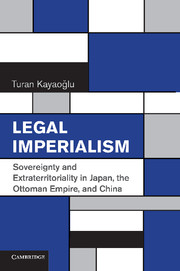Book contents
- Frontmatter
- Contents
- Tables and Figures
- Acknowledgments
- Introduction: Extraterritoriality in British Legal Imperialism
- 1 Positive Law and Sovereignty
- 2 Extraterritoriality and Legal Imperialism
- 3 Japan's Rapid Rise to Sovereignty
- 4 The Ottoman Empire's Elusive Dream of Sovereignty
- 5 China's Struggle for Sovereignty
- Conclusion: American Legal Imperialism – Extraterritoriality Today
- Bibliography
- Index
1 - Positive Law and Sovereignty
Published online by Cambridge University Press: 25 May 2010
- Frontmatter
- Contents
- Tables and Figures
- Acknowledgments
- Introduction: Extraterritoriality in British Legal Imperialism
- 1 Positive Law and Sovereignty
- 2 Extraterritoriality and Legal Imperialism
- 3 Japan's Rapid Rise to Sovereignty
- 4 The Ottoman Empire's Elusive Dream of Sovereignty
- 5 China's Struggle for Sovereignty
- Conclusion: American Legal Imperialism – Extraterritoriality Today
- Bibliography
- Index
Summary
Although they differ on many points about the emergence and function of sovereignty in the international system, international relations scholars seem to agree that sovereignty emerged as a product of intra-European thought and practices. This Eurocentric consensus ignores the role Western imperial ideology and the colonial encounter played in the construction of sovereignty. In these encounters, Western state practices and judicial discourses clarified, crystallized, and consolidated the elements of sovereignty doctrine. In particular, jurists defined, identified, and categorized sovereign and nonsovereign entities. Sovereignty criteria then conditioned, shaped, and legitimized Western colonial domination by excluding all non-Western entities from the sphere of sovereignty. In important ways, the articulation of sovereignty is embedded in the domestic legal episteme of the leading imperial state(s). Jurists, statesmen, and diplomats of the imperial states articulated sovereignty norms and practices to deal with legal and political problems the colonial encounter created within the parameters of “law.” I call these parameters of law, specifically the collective understandings and discourses determining the scope, application, and underlying values of the laws, legal episteme, and I argue that the nineteenth-century British imperial legal episteme, shaped within legal positivism, is key to the construction of “Westphalian” sovereignty.
Imperialism has been a nonissue for most international relations scholars who study sovereignty. Yet, imperialism has been the most durable, visible, and significant violation of the Westphalian sovereignty of non-Western states. Scholarly neglect of this issue is particularly troubling as the norms and practices of both Westphalian sovereignty and nineteenth-century imperialism emerged around the same time, and international jurists provided the legal framework for both.
- Type
- Chapter
- Information
- Legal ImperialismSovereignty and Extraterritoriality in Japan, the Ottoman Empire, and China, pp. 17 - 39Publisher: Cambridge University PressPrint publication year: 2010



